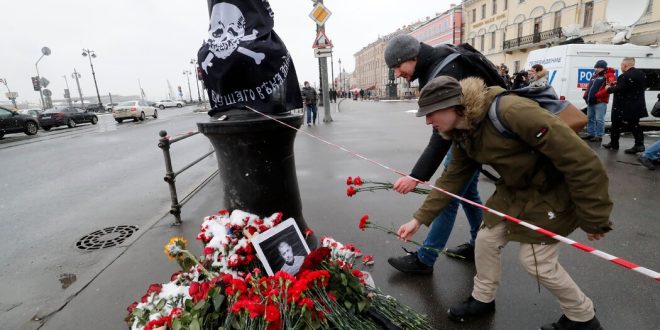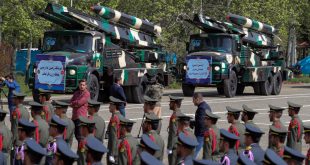The Russian military blogger killed on Sunday in an explosion in St. Petersburg was a prominent figure in an increasingly vocal and influential movement of conservative and hawkish activists who broadly support the Kremlin, but also often criticize its conduct of the war in Ukraine.
The blogger, Maksim Fomin, who was more popularly known by his pen name of Vladlen Tatarsky, represented a radical wing of pro-invasion bloggers and activists who have backed Moscow’s war but also criticized what they see as flaws in the Russian Army.
The wider group is largely made up of former and current members of Russia’s armed services, activists, volunteer fighters and procurers of military equipment — some originally from eastern Ukraine.
Since Russia launched its full-scale invasion of Ukraine in February last year, they have collectively accumulated millions of followers on Telegram, a social media app that has emerged as one of the main platforms for news in Russia’s restrictive media climate.
Their commentary is seen as demonstrating that the Kremlin’s rationale for its brutal invasion of Ukraine enjoys genuine and robust support in some circles within Russian society.
Since February last year, Mr. Tatarsky’s blog had accumulated tens of thousands of subscribers who came to watch his snappy daily video updates, some of which were filmed after he visited Russian military units on the front lines in Ukraine. In the videos, he described various problems faced by the Russian Army and gave his forecasts about their battlefield movements.
He began to frequently appear on Russian state television and eventually attracted the attention of the government. In September, he was invited to the Kremlin to hear President Vladimir V. Putin announce the annexation of four Ukrainian regions, a move broadly denounced by Western nations.
In his video from the Kremlin that day, Mr. Tatarsky said: “We’ll conquer everyone, we’ll kill everyone, we’ll loot whoever we need to, and everything will be just as we like it.”
Mr. Tatarsky argued that Russia needed to eliminate Ukraine as a state; he and others who supported his argument have often said that they are prepared to accept nothing less than a total victory by Moscow over Kyiv.
In an online tribute to Mr. Tatarsky, Starshe Eddy, another popular military blogger, called on everyone “with arms in their hands and who loved Vladlen” to remember that “there won’t be a better last feast for our brother than a destroyed enemy.”
“Russia’s victory is everything that Maksim Fomin dreamed about,” Starshe Eddy wrote in a post on Telegram. “This is everything that we spoke about at our every meeting.”
But as evidence has mounted in recent weeks that Moscow has failed to make much progress during months of fighting in the Donbas, the industrial and agricultural region of eastern Ukraine close to the Russian border, military bloggers and like-minded activists have lamented the lack of progress.
Mr. Tatarsky spoke about the need to “change the system” and blamed army bureaucracy and lack of advanced weapons, most of all drones, for the stalling of Russia’s offensive. He never directed his criticism at Mr. Putin, however, whom he referred to as “Our Caesar,” instead focusing his ire on the Russian military’s top brass.
Mr. Tatarsky often used inflammatory and divisive language to describe his attitude toward the Ukrainian state and culture. He argued that many Ukrainians were actually Russians who were brainwashed to turn against their homeland. He also supported missile strikes against Ukrainian civilian areas.
Born in Makiivka in eastern Ukraine, Mr. Tatarsky, who died at age 40, said in his videos that he had been against Ukraine’s independence since childhood. Ukraine separated from the Soviet Union in 1991.
According to his own autobiographical books, Mr. Tatarsky started his career as a miner in Makiivka, like his father. In 2006, he opened a small business producing and selling furniture. In 2011 he robbed a bank and was sentenced by a Ukrainian court to eight years in prison for armed assault. In 2014, he was released from a penal colony by a group of pro-Moscow forces and joined their ranks as a volunteer fighter, he said in his books.
He fought with various pro-Moscow factions until 2019, when he became a blogger and writer and moved to Russia. Mr. Tatarsky penned two autobiographical books and a volume of short stories. In 2021, he obtained Russian citizenship.
Mr. Tatarsky is not the only prominent Russian military blogger to have had roots in Ukraine. Yuri Podolyaka, perhaps the most popular with 2.7 million followers, is from the northeastern Ukrainian region of Sumy. Mr. Tatarsky, along with some other activists and public figures who became loyal to Moscow, was particularly loathed by the government in Kyiv and its supporters.
 Top Naija News: Nigerian News, Breaking News Nigeria and World News Top Naija News is a daily news publication in Nigeria, delivering the latest breaking news in Nigeria and around the world.
Top Naija News: Nigerian News, Breaking News Nigeria and World News Top Naija News is a daily news publication in Nigeria, delivering the latest breaking news in Nigeria and around the world.




